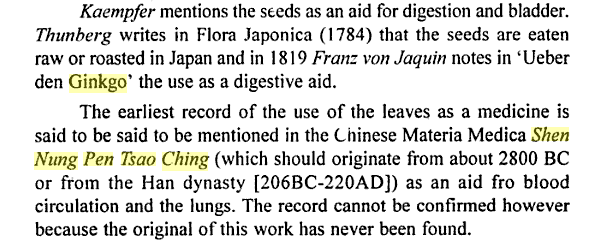![The Ginkgo biloba tree leaves are easily recognizable, and often associated with brain health. By THOR (originally posted to Flickr as Gingko Leaf) [CC BY 2.0], via Wikimedia Commons](https://nootropicgeek.com/wp-content/uploads/2016/10/1024px-GingkoLeaf-nootropic.jpg)
The pun is intentional: ginkgo is a grandpa because it:
- comes from a tree species that is a “living fossil,” over 200 million years old;
- Has been used as a medicinal herb for a long time, over 2,000 years;
- Has historically been associated with memory benefits in geriatric populations.
But I’m here to tell you, ginkgo biloba isn’t just for elderly people. Showing flashes of fast-acting, multi-tasking nootropic activity, Ginkgo biloba is an underappreciated brain health herb among younger populations, who might benefit from its bio-activities just as much as the old-timers.
Page Contents
How Ginkgo Biloba Is Supposed to Work
Ginkgo biloba skyrocketed to fame as an “memory pill”, quickly solidifying its place among the most important brain nutrients for people age 55+ to keep their cognition sharp. But over the years, Ginkgo seemed to fade in popularity, overtaken by sexier stacks and Dr. Oz “flavor of the month” nootropics.
If you ask this Geek, ginkgo should never have left the top of the charts.
Don’t call it a comeback – Ginkgo biloba has been here for years. Millions of years, actually.
![Ginkgo so old, Pterodactyls used to sit on em. True story. By Heinrich Harder (1858-1935) (The Wonderful Paleo Art of Heinrich Harder) [Public domain or Public domain], via Wikimedia Commons](https://nootropicgeek.com/wp-content/uploads/2016/10/Paleo-Ginkgo.jpg)
I also like ginkgo because of its pedigree; it has been used in Traditional Chinese Medicine (TCM) for a long time.
Check out this passage, which suggests that ginkgo was used for thousands of years ago in China for one of the same bioactivities it is used for today: enhancing circulation.

Ginkgo biloba has been around forever.
Supposedly, Ginkgo biloba has been the the subject of over 400 different research studies. And yet, there is still some mystery about exactly how it works, and some conflict on whether it is truly effective or not.
I, for one, am a believer. Starting with its most famous beneficial bioactivity, let’s check out all of the bioactivities associated with ginkgo biloba and brain health:
Natural cerebral circulation booster
Ginkgo biloba’s main claim to fame for brain health is its vasodilator effect, which relaxes blood vessels to encourage robust cerebral circulation. Ginkgo’s active compounds may also counter clotting factors, helping make blood cells more slippery so they can flow easier. When cerebral circulation is healthy, the brain receives oxygen for peak energy metabolism. Good cerebral circulation also supports delivery of any other nootropics you might be taking to the brain.
Side note: Circulation benefits are also why ginkgo is sometimes used to help with tinnitus.
![Image of cerebellar blood flow, illustrating Superior cerebellar artery (SCA), Posterior inferior cerebellar artery (PICA), Anterior inferior cerebellar artery (AICA). By CFCF [CC BY-SA 3.0], via Wikimedia Commons](https://nootropicgeek.com/wp-content/uploads/2016/10/Cerebellar_blood_flow-ginkgo.png)
Neurotransmitter support
Animal research has suggested that ginkgo biloba seems to protect circulating acetylcholine, helping to sustain its presence in the blood and brain. Besides being important for memory and overall cognitive performance, acetylcholine decline seems to be linked to brain degeneration, so this is an important property of ginkgo biloba that has led researchers to suggest it might be useful for dementia. Some other animal research shows ginkgo may modulate norepinephrine and serotonin, as well, suggesting additional neurotransmitter benefits.
Antioxidant protection
I like this wildcard benefit of ginkgo biloba, because it doesn’t seem like everybody knows about it – it is actually a pretty powerful antioxidant. This is a good complement to its circulation-boosting activity. Just as Ginkgo helps bring more oxygen to the brain, for better energy metabolism, which generates more damaging free radicals… it supplies the antioxidant activity to help keep that oxidative stress in check. Ginkgo’s antioxidant activity is one reason why it seems to have earned a reputation as a neuroprotective nootropic herb.
Another possible neuroprotective bioactivity that I am not quite on board with…
Potential anti-amyloid activity
I hesitate to include this particular bioactivity because the research is so early. This is test tube grade research, so keep that in mind and take the results with a grain of salt. Ginkgo biloba has been suggested to inhibit the formation of irregular proteins called amyloids that are associated with Alzheimer’s and other brain degeneration issues. This might be a minor ginkgo side benefit, but I wouldn’t quite count on it.
Ginkgo Biloba Benefits

Brain supplement manufacturers have long positioned ginkgo biloba as a memory supplement, especially for those annoying memory problems that are associated with brain aging.
Some will claim that this support goes so far as to delay the onset of, or slow the progression of, degenerative brain issues like dementia.
If you ask me, these manufacturers are spot on – suggesting in conservative language ginkgo’s most likely benefits. But I’m not a supplement manufacturer. I have to believe that ginkgo does more than just help memory and aging populations. As one of the most time-tasted brain circulation boosters, ginkgo biloba probably helps with mental energy, attention, and focus, too.
Let’s see what the researchers say about ginkgo’s effectiveness.
But first, a word from our sponsor: The Ginkgo Biloba tree.
![Ginkgo biloba, also called the Maidenhair Tree, is so majestic I just gotta include an image. They can grow up to 80 fee tall. By EecherplazGinkgo06.jpg: Cayambederivative work: Ginkgotree (EecherplazGinkgo06.jpg) [CC BY-SA 3.0 or GFDL], via Wikimedia Commons](https://nootropicgeek.com/wp-content/uploads/2016/10/Ginkgo-Tree-Tall-745x1024.jpg)
I have got to give a quick disclaimer on this next research section. Ginkgo biloba has been widely researched, with studies numbering in the hundreds. Not all of the research is positive. But I can’t report on every single study, so what I’ve done here is pick out a handful of ginkgo biloba studies, both positive and negative, that were interesting to me.If you want more, here is a link to pub med. Go crazy.
Researchers Have Suggested Ginkgo Biloba Might:
Fail at helping with dementia
In this huge study, 3069 volunteers over the age of 75 in good brain health took 120 mg of a ginkgo biloba extract (or placebo) two times per day over the course of 6.1 years. Researchers discovered that in the ginkgo biloba group, the dementia rate was 3.3 per hundred years of life span. In the placebo group? 2.9 per hundred years of life span.
Researchers concluded that ginkgo biloba at 120 mg two times daily was not effective for dementia or Alzheimer’s in elderly people who were in good brain health.
Significantly improve long-term memory in adults over age 55
In this double-blind, placebo-controlled research study, 93 adults between the ages of 55 and 79, along with 104 adults between the ages of 18 and 43, took 120 mg of ginkgo biloba per day over 12 weeks. Subjects were tested for aspects of cognition, mood, and attention.
Researchers reported that the group of older adults experienced a significant improvement in long-term memory. However, researchers acknowledge that no other aspect of cognition was significantly improved by ginkgo in either group.
Enhances working memory in two days of supplementation
This clinical study administered a placebo pill or one of four different doses of ginkgo biloba extract (150 mg, 300 mg, 120 mg, 240 mg) for two days. The ginkgo biloba extract was administered as both single doses and spread out as three smaller doses during the day. Psychometric battery testing was performed before taking the ginkgo biloba, and then at several different intervals over the course of 11 hours.
Researchers found that ginkgo biloba extract effects were significant, with the most pronounced benefits for memory – especially working memory. Researchers noted that the 120 mg dose of ginkgo appeared to be the most effective, and that these benefits are more likely in adults in their 50s.

Improves and sustains attention in younger adults
This study used three different dosages of ginkgo as a standardized extract (GK 501, 120 mg, 240 mg, 360 mg) administered to 20 young volunteers. Study subjects were tested for cognitive performance before supplementation and at hours one, 2 1/2, four and six. Researchers reported that compared with placebo, ginkgo biloba group experience significant cognitive performance changes.
Researchers noted the most striking benefit was seen for speed of attention, in a dose-dependent factor: both the 240 mg and 360 mg dosages of ginkgo biloba produced attention enhancements after 2.5 hours, with those benefits lasting an additional 2 1/2 hours. Researchers concluded that the ginkgo seems to bring a sustained improvement in attention performance in younger adults.
Boosts short-term memory by 26%, but fails other cognitive performance aspects
In this study, 241 volunteers between the ages of 55 and 66 with mild memory problems related to aging were given either a placebo, high potency ginkgo extract, or low potency ginkgo extract daily for 24 weeks. Throughout the study, subjects were tested for a variety of mental performance parameters including short-term memory, long-term memory, attention, and concentration. At the study’s conclusion, researchers reported that ginkgo biloba supplementation was largely ineffective, except in the area of short-term visual memory.
For this specific aspect of cognition — short-term visual memory — the ginkgo was associated with a:
- 26% improvement in the low potency extract group
- 18% improvement in the high potency extract group
- 11% improvement in the the placebo group
Researchers suggested that based on these results, ginkgo seems to show some promise for elderly patients who are already in cognitive decline.
![It it just me, or does ginkgo leaf look kinda like a brain stem? Maybe that was an early hint to Traditional Chinese Medicine herbalists. By English: This image was scanned or photoreproduced by Andrew Butko. Contact infоrmation - e-mail: abutko@gmail.com. Other scans see here.Русский: Это изображение было отсканировано или перефотографировано Андреем Бутко. Контактная информация - e-mail: abutko@gmail.com. Другие отсканированые предметы см. здесь. (selfmade scanning) [GFDL 1.3, CC-BY-SA-3.0 or CC BY-SA 2.5-2.0-1.0], via Wikimedia CommonsBy English: This image was scanned or photoreproduced by Andrew Butko. Contact infоrmation - e-mail: abutko@gmail.com. Other scans see here.Русский: Это изображение было отсканировано или перефотографировано Андреем Бутко. Контактная информация - e-mail: abutko@gmail.com. Другие отсканированые предметы см. здесь. (selfmade scanning) [GFDL 1.3, CC-BY-SA-3.0 or CC BY-SA 2.5-2.0-1.0], via Wikimedia Commons](https://nootropicgeek.com/wp-content/uploads/2016/10/Ginkgo_biloba_scanned_leaf.jpg)
![Maybe a little. By Images are generated by Life Science Databases(LSDB). [CC BY-SA 2.1 jp], via Wikimedia Commons](https://nootropicgeek.com/wp-content/uploads/2016/10/Brainstem-e1477088046294.png)
How to Take Ginkgo Biloba
- 120 mg to 240 mg of ginkgo extract is a typical daily dosage range for age-related cognitive performance, usually in capsules, less often in tablets
- Younger populations seeking ginkgo’s performance-oriented nootropic benefits should consider higher dosage products, 240 mg to 500 mg
- Look to buy ginkgo biloba herb that is standardized to supply up to 24% Ginkgo Flavone Glycosides, which are the active nootropics
My Experience with Ginkgo Biloba
I gotta be honest: I have no experience with ginkgo biloba. Not a ginkgo user. Nope.
The reason why is straight-up age discrimination. I have always associated ginkgo biloba with cognitive benefits and much older people than I am; people well into their 70s and 80s. Even in reviews, I usually read about Ginkgo biloba in the context of age-related memory problems.
That’s not the kind of brain support I’m looking for.
Besides that, I already take a vasodilator nootropic that functions kind of like ginkgo biloba: Vinpocetine.
Still, the more that I learn about ginkgo biloba the more I want to give it a try.
When I look at the totality of research, it ironically seems to me that if anything ginkgo biloba’s classic associations with memory support for aging brains might not be the best benefits that it offers.
Looking at the research suggesting faster acting benefits in younger populations, I become more curious about ginkgo biloba as a mental performance enhancer rather than an age-related support supplement.
Again, I already get some of those benefits from Vinpocetine, but one of these months I will give ginkgo biloba supplements a shot instead of imposed teen and see if I feel any difference… at which time I will report back to you, dear reader.
Is Ginkgo Biloba a Good Nootropic?
![Oh yeah, ginkgo is THAT old... this fossil dates back 49 MILLION years. By Kevmin (Own work) [CC BY-SA 3.0 or GFDL], via Wikimedia Commons](https://nootropicgeek.com/wp-content/uploads/2016/10/Ginkgo_biloba_fossil-287x300.jpg)
Ginkgo looks great for circulation – but then again, so do a few other nootropics. And ginkgo biloba is not my #1 choice for boosting blood flow to the brain.
The real X factors with this herbal nootropic are all of its other potential bioactivities – for neurotransmitters, neuroprotection, and possibly defense against irregular protein clusters in the brain that are linked with degenerative brain problems.
In a best case scenario, ginkgo biloba might turn out to be on all-around nootropic brain booster – effective for both short term thinking and memory and mental clarity way down the road, when you enter older age.
And something about that just feels right: that this majestic, legendary living fossil tree, 200+ millions old, which can live as a specimen over 2,000 years, used as medicine for hundreds of years… might offer versatile brain support, especially as years and decades go by in our lives.
Let’s check those ratings…
Overall Ginkgo Biloba Nootropic Power Rating
[yasr_multiset setid=0]
